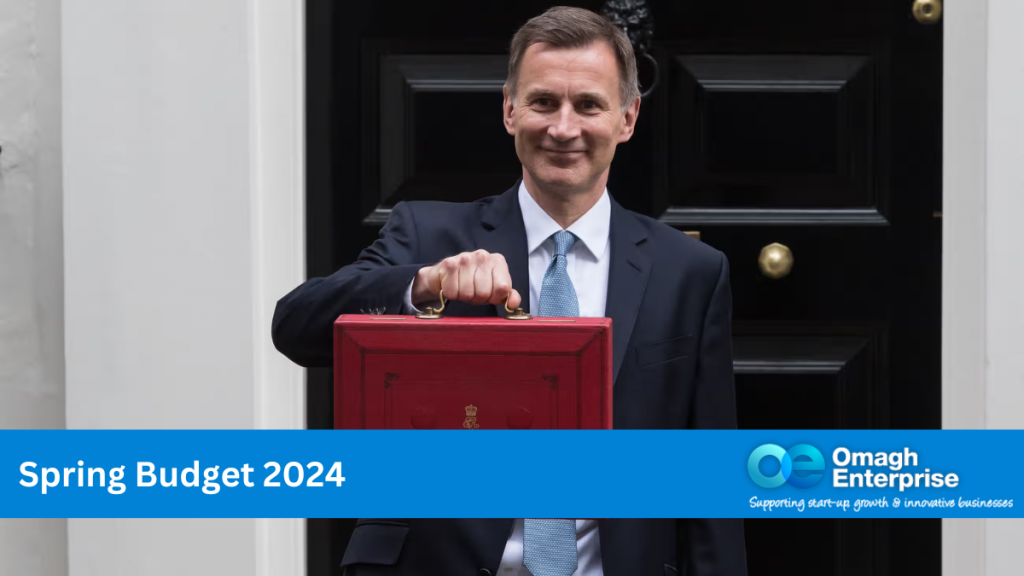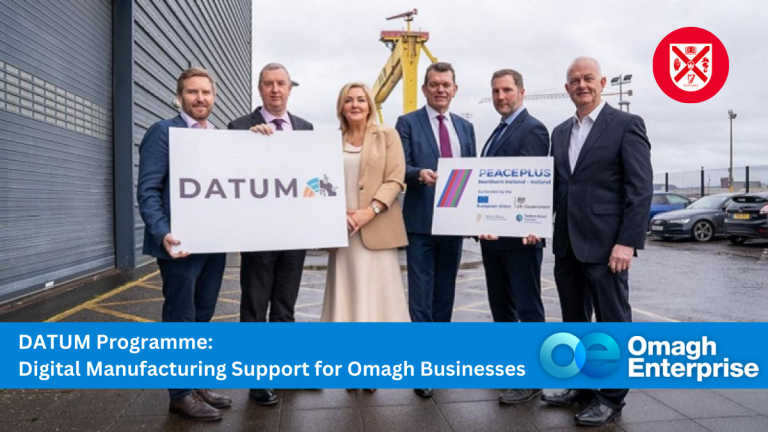A summary of how the Spring Budget affects Northern Ireland businesses.
The Chancellor, Jeremy Hunt, delivered his Spring Budget on Wednesday 6 March 2024. We have summarised the key points from the Spring Budget and specific issues affecting Northern Ireland businesses.
Forecasts
Growth forecast
- 0.8% in 2024
- 1.9% in 2025
- 2.0% in 2026
- 1.8% in 2027
- 1.7% in 2028
Debt Forecast
- 91.7% of GDP in 2024-25
- 92.8% of GDP in 2025-26
- 93.2% of GDP in 2026-27
- 93.2% of GDP in 2027-28
- 92.9% of GDP in 2028-29
Borrowing forecast
- 4.2% of GDP in 2023-24
- 3.1% of GDP in 2024-25
- 2.7% of GDP in 2025-26
- 2.3% of GDP in 2026-27
- 1.6% of GDP in 2027-28
- 1.2% of GDP in 2028-29
Northern Ireland-specific announcements
The Northern Ireland Executive will receive an additional £100 million in funding through the Barnett formula in 2024-25.
Up to £20 million to invest in the communities and regeneration of towns and cities across the UK including Derry~Londonderry and Coleraine.
The government is committing £2 million to boost global investment and trade opportunities for Northern Ireland.
Taxes
National Insurance
From 6 April 2024, the main rate of employee National Insurance will be cut by 2p from 10% to 8%.
From 6 April 2024, the main rate of self-employed Class 4 National Insurance Contributions will be cut by 2p from 9% to 6%.
See National Insurance rates and classes.
VAT
From 1 April 2024, the VAT registration threshold will increase from £85,000 to £90,000 and the deregistration threshold from £83,000 to £88,000.
Capital Gains Tax
From 6 April 2024, the higher rate of Capital Gains Tax for residential property disposals will be cut from 28% to 24%. The lower rate will remain at 18% for any gains that fall within an individual’s basic rate band.
Non-UK domicile tax regime
This measure abolishes the remittance basis of taxation for non-UK domiciled individuals and replaces it with a simpler residence-based regime. Individuals who opt into the new regime will not pay UK tax on any foreign income and gains arising in their first four years of tax residence, provided they have been non-tax resident for the last 10 years. This new regime will commence on 6 April 2025 and applies UK-wide.
Duties
Alcohol duty
Alcohol duty will remain frozen until 1 February 2025, extending the six-month freeze announced at the Autumn Statement 2023. See alcohol duties.
Fuel duty
The temporary 5p cut in fuel duty will be extended for a further 12 months until March 2025 and the planned inflation-linked increase for 2024-25 will be cancelled. This means that fuel duty remains at 52.95 pence per litre.
Tobacco duty
A new duty on vaping products will be introduced from 1 October 2026, linked to the levels of nicotine. Registrations for the new duty will open from 1 April 2026.
Tobacco duty to go up £2.00 per 100 cigarettes or 50 grams of tobacco from 1 October 2026.
Stamp Duty Land Tax
From 1 June 2024, Multiple Dwellings Relief, a bulk purchase relief in the Stamp Duty Land Tax regime in England and Northern Ireland will be abolished. See stamp and property taxes.
Investment
The government will seek to extend full expensing to assets for leasing when fiscal conditions allow and will publish draft legislation shortly.
Finance
The Recovery Loan Scheme has been renamed as the Growth Guarantee Scheme and has been extended until 31 March 2026. The scheme offers a 70% government guarantee on loans to SMEs of up to £1 million in Northern Ireland.
The government will create an additional Individual Savings Account (ISA) with a £5,000 allowance. This would be in addition to the £20,000 that can be subscribed into an ISA. The government will consult on the details.
HMRC guidance on retraining tax deductibility
HMRC has published new guidance around the tax deductibility of training costs for sole traders and the self-employed. This guidance ensures that updating existing skills, maintaining pace with technological advancements, or changes in industry practices, are allowable costs when calculating taxable profits.
Child Benefit
From April 2024, the High Income Child Benefit Charge (HICBC) threshold will increase from £50,000 to £60,000. The rate of the charge will also be halved so that Child Benefit is not repaid in full until you earn £80,000.
The government plans to administer the HICBC on a household rather than an individual basis by April 2026 and will consult in due course.
Industry-specific support
Green industries
A further £120 million is to be made available for the Green Industries Growth Accelerator to support the expansion of low-carbon manufacturing supply chains across the UK.
Creative industries
A UK Independent Film Tax Credit will be introduced at a rate of 53% on qualifying film production expenditure. This enhanced Audio-Visual Expenditure Credit will be available for films with budgets under £15 million that meet the requirements of a new British Film Institute test. Productions can make claims from 1 April 2025, in respect of expenditure incurred from 1 April 2024 onwards provided that films started principal photography from 1 April 2024.
Digital technology and artificial intelligence
The government is announcing a new £7.4 million AI Upskilling Fund pilot that will help SMEs develop the AI skills of the future.
Life sciences
The government is providing £45 million through the Medical Research Charities Early Career Researchers Support Fund.
Advanced manufacturing
There will be a further £270 million of investment into innovative new automotive and aerospace R&D projects, building the UK’s capabilities in zero-emission vehicle and clean aviation technology.
Further details
See full details and accompanying HM Treasury documentation for the Spring Budget 2024




